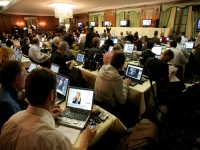Lifestyle
WHAT HAPPENS WHEN JOURNALISTS FALL
BEING OR NOT A VOICE FOR THE PUBLIC

(Source: © Ruby BIRD & Yasmina BEDDOU)
USPA NEWS -
As its best, journalism is about telling stories with lashings of style that give people both context and insight into the events that shape their lives. It is a rôle that journalists have played for more than a century and it has been a core component of democratic life...
As its best, journalism is about telling stories with lashings of style that give people both context and insight into the events that shape their lives. It is a role that journalists have played for more than a century and it has been a core component of democratic life. Quality journalism make Citizens more aware, Government more transparent, and Society more democratic.
Questions have become urgent and compelling in the age of global communication. Money and politics have always exerted pressure on the work of media, but respect for ethical norms in journalism has been further weakened as the traditional industry has plunged into an enduring crisis. Quality has suffered in the wake of financial cuts that have diminished both the number of jobs and the quality of journalism itself.
When journalists aspire to tell stories based upon truth-telling, accuracy and fairness, when they seek to minimise harm, and when they make themselves accountable to peers and the wider community, they define the essential elements of what we might call journalism as a public good.
Everywhere mobile telephones provide millions of new insights into events as they happen. People have greater access to information and more opportunities to respond to what they see. But with these new freedoms come questions about responsibility in the use of information. Where do we need a new ethic of information that promotes transparency and responsibility in the dissemination of information.
Everywhere mobile telephones provide millions of new insights into events as they happen. People have greater access to information and more opportunities to respond to what they see. But with these new freedoms come questions about responsibility in the use of information. Where do we need a new ethic of information that promotes transparency and responsibility in the dissemination of information.
The experience of journalists is that using the law to restrain media, even those framed with the best intentions, such as those covering defamation, hate-speech and privacy, can become weapons to restrict journalistic work and to protect people in power from legitimate scrutiny.
The changes inside journalism has already transformed the media scene and the work of journalists. Much of the change is liberating : more freedom to access information, more access to technology that allows the story to be multimedia and told in more vivid terms. But the pace of work, pressure of continuous deadlines and the voracious appetite of a 24-hour news system lowered the capacity of newsrooms to deliver quality journalism.
The changes inside journalism has already transformed the media scene and the work of journalists. Much of the change is liberating : more freedom to access information, more access to technology that allows the story to be multimedia and told in more vivid terms. But the pace of work, pressure of continuous deadlines and the voracious appetite of a 24-hour news system lowered the capacity of newsrooms to deliver quality journalism.
Ruby Bird Journalists A Voice The Public Stories Style People Context Insight Events Role Century Democratic Life Quality Citizens Aware Government Transparent Society Money Ethical Norms Industry Crisis Financial Jobs
Liability for this article lies with the author, who also holds the copyright. Editorial content from USPA may be quoted on other websites as long as the quote comprises no more than 5% of the entire text, is marked as such and the source is named (via hyperlink).






